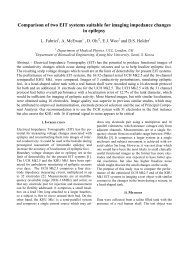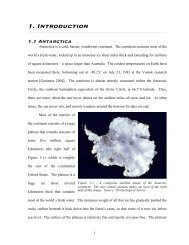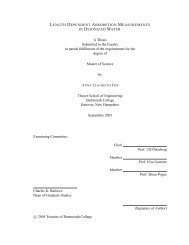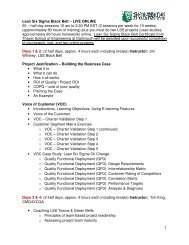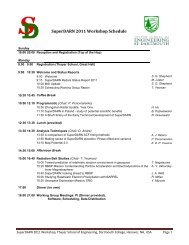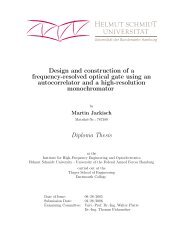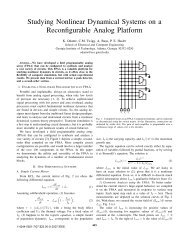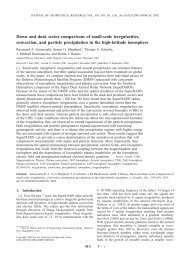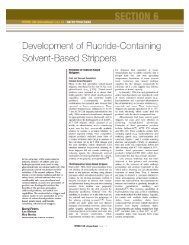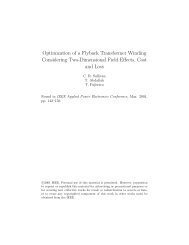Courses Programs - Thayer School of Engineering - Dartmouth ...
Courses Programs - Thayer School of Engineering - Dartmouth ...
Courses Programs - Thayer School of Engineering - Dartmouth ...
You also want an ePaper? Increase the reach of your titles
YUMPU automatically turns print PDFs into web optimized ePapers that Google loves.
graduate courses<br />
110<br />
ENGS 202 Nonlinear Systems<br />
Offered alternate years: 12W: 2A<br />
The course provides basic tools for modeling, design, and stability analysis <strong>of</strong> nonlinear<br />
systems that arise in a wide range <strong>of</strong> engineering and scientific applications<br />
including robotics, autonomous vehicles, mechanical and aerospace systems, nonlinear<br />
oscillators, chaotic systems, population genetics, learning systems, and networked<br />
complex systems. There are fundamental differences between the behavior <strong>of</strong> linear<br />
and nonlinear systems. Lyapunov functions are powerful tools in dealing with design<br />
and stability analysis <strong>of</strong> nonlinear systems. After addressing the basic differences<br />
between linear and nonlinear systems, the course will primarily focus on normal<br />
forms <strong>of</strong> nonlinear systems and Lyapunov-based control design methods for a variety<br />
<strong>of</strong> applications with an emphasis on robotics, mechanical control systems, and particle<br />
systems in potential fields.<br />
Prerequisite: ENGS 100 and ENGS 145 or equivalents and familiarity with MATLAB<br />
Instructor: Olfati-Saber<br />
ENGS 205 Computational Methods for Partial Differential Equations II<br />
Offered alternate years: 11S: 11<br />
Boundary element and spectral methods are examined within the numerical analysis<br />
framework established in ENGS 105. The boundary element method is introduced in<br />
the context <strong>of</strong> linear elliptic problems arising in heat and mass transfer, solid mechanics,<br />
and electricity and magnetism. Coupling with domain integral methods, e.g.,<br />
finite elements, is achieved through the natural boundary conditions. Extensions<br />
to nonlinear and time-dependent problems are explored. Spectral methods are introduced<br />
and their distinctive properties explored in the context <strong>of</strong> orthogonal bases<br />
for linear, time-invariant problems. Extension to nonlinear problems is discussed in<br />
the context <strong>of</strong> fluid mechanics applications. Harmonic decomposition <strong>of</strong> the timedomain<br />
is examined for nonlinear Helmhotz-type problems associated with E&M<br />
and physical oceanography.<br />
Prerequisite: ENGS 105<br />
Instructor: Paulsen<br />
ENGG 210 Spectral Analysis<br />
(Can be used by undergraduates for A.B. course count only)<br />
Offered alternate years: 12S: arrange<br />
An advanced treatment <strong>of</strong> digital signal processing for the analysis <strong>of</strong> time series.<br />
A study is made <strong>of</strong> parametric and nonparametric methods for spectral analysis. The<br />
course includes a review <strong>of</strong> probability theory, statistical inference, and the discrete<br />
Fourier Transform. Techniques are presented for the digital processing <strong>of</strong> random<br />
signals for the estimation <strong>of</strong> power spectra and coherency. Examples are taken from<br />
linear system theory and remote sensing using radar. Laboratory exercises will be<br />
assigned requiring the use <strong>of</strong> the computer.<br />
Prerequisite: ENGS 110<br />
Instructor: Hansen<br />
ENGG 212 Communications Theory<br />
(Can be used by undergraduates for A.B. course count only)<br />
Not <strong>of</strong>fered 2010–2011<br />
An advanced treatment <strong>of</strong> communications system engineering with an emphasis<br />
on digital signal transmission. The course includes a review <strong>of</strong> probability theory,<br />
random processes, modulation, and signal detection. Consideration will be given to<br />
channel modeling, the design <strong>of</strong> optimum receivers, and the use <strong>of</strong> coding.<br />
Prerequisite: ENGS 110




